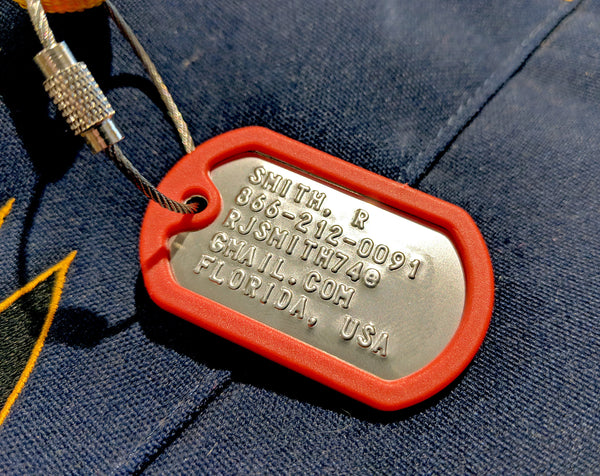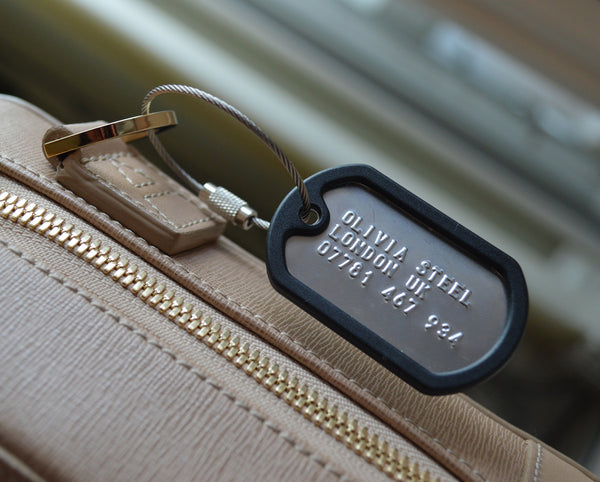What should I put on my luggage tags?
There are competing schools of thought about what you should put on your luggage tag, but whatever you do put on there, logic dictates that you will be better off with something more substantial than a standard airline paper tag - particularly if you are going a bit more off the beaten path or connecting through several airports (meaning more bag friction). Of course the other problem with airline tags is that you have to fill it out every trip, in the queue, and you're hot, and there's a load to do, and you can't find your pen.
So clearly, the best way to do it and identify your luggage is by use of a permanent tag - and you can't get more permanent than one of our Toughtags. Embossed stainless steel will always be legible and with our proprietry coloured tag housing, will be highly visible for someone trying to reconnect you and your bags.
Your information options
I started off by saying there are competing shools of thought on this, by which I mean that some people don't think you should put your address on your tag - their logic being that if you are separated from your bag, a would-be robber knows that you are away from home and will go and ransack your house. Personally, I don't subscribe to this train of thought - you'd have to be a pretty paranoid person to think there is an international network of thieves waiting to trade information on potentially empty houses. I say potentially empty as who's to say there isn't a body-building MMA fighting relative in residence? Your address (or part of it) is a useful piece of information for a lost luggage official to try and correspond to your name so don't discount it altogether. Nontheless, you do have limited space to use so it's not always appropriate to put a geographical address depending on the type of travel you do and the contact information you are able to give.
At Toughtags, we have specifically added some new characters to our military embossing machines to enable us to be more flexible with contact information. In particular the most useful ones are the '+' symbol, allowing us to do full telephone numbers with international dialling codes, and the '@' symbol which alows you to put either your email address, twitter handle or instagram handle on to your luggage tags. We thought that giving customers a wide choice would be key in allowing them to customize their tags according to their needs.
And that's what this really boils down to - how to contact you. Surely the easier you make someone's job to get in touch with you, the ysooner you will see your bag again? For example, if you just put "Richard Smith, Florida" on your tag, what level of administrative digging is going to be required to contact you and reunite you? Contrast that with a Toughtag laid out in the following way:
SMITH, R
866-212-0091
RJSMITH74@
GMAIL.COM
FLORIDA, USA

So that's a pretty comprehensive set of information there in a small space that gives several options to be able to identify and contact an individual. The fact that it has the country of origin on there means the international dialling code is not essential too.
Alternatively, if you are just wanting to identify a bag for use around town then you could keep it minimal, as in the example below - perfect for a laptop bag in the city for example.
OLIVIA STEELE
LONDON UK
07781 467 934

So in summary........
What should you put on your luggage tag? It depends on your circumstances but we'd recommend something like:
- NAME (surname at the least)
- PHONE NUMBER (with your international dialling code if you need it)
- EMAIL ADDRESS (if it fits, but you could break it across 2 lines)
- CITY and COUNTRY
But there is no right or wrong answer - have a play on our tag visualizer on the homepage and see what you can come up with!

